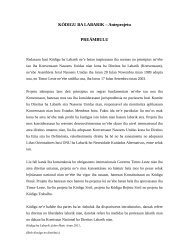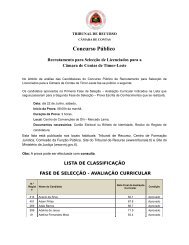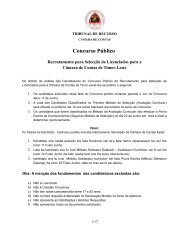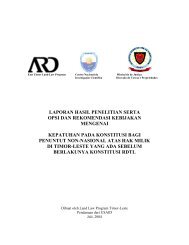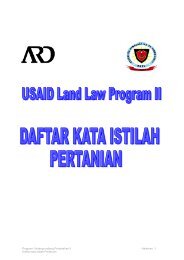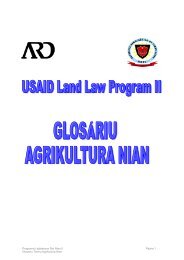English
English
English
Create successful ePaper yourself
Turn your PDF publications into a flip-book with our unique Google optimized e-Paper software.
4. REVIEW OF INTERNATIONAL<br />
AND OTHER COMPARATIVE<br />
LAW REGARDING<br />
COMPENSATION<br />
4.1 COMPENSATION ACCORDING TO INTERNATIONAL LAW<br />
In international law, payment of compensation is also a prerequisite for valid expropriation of private<br />
property by a sovereign state. The right to expropriate is within the competence of a sovereign state, but<br />
the compensation requirement imposes a legal condition on this competence.<br />
Since the beginning of the last century, the majority of states have supported an “international minimum<br />
standard” or a “moral standard for civilized states” for determining compensation. The Declaration of the<br />
United Nations General Assembly on Permanent Sovereignty over Natural Resources adopted in 1962<br />
affirms this standard. It has also enjoyed the support of many tribunals and claims commissions.<br />
The international standard is in line with the “Hull formula,” enunciated by United States Secretary of<br />
State Cordell Hull in 1938 and subsequently adopted by industrialized nations. This formula requires that<br />
compensation must be “prompt, adequate and effective.” In essence, this means that the nationalizing<br />
state should make payment in a currency that can be readily used (not, for example, devaluated local<br />
currency), that it should reflect the full value of the expropriated property, perhaps incorporating an<br />
element for future lost profits, and that it must be handed over within a reasonable time after the<br />
expropriation, failing which, interest should be paid. Developing states, however, have objected to this<br />
formula, not least because it requires them to pay out substantial capital sums when the very reason for<br />
the expropriation may have been that they were in serious financial difficulty. These states instead support<br />
the view that the alien can only expect equal treatment under the local law because he or she submits to<br />
the local dispensation, with its built-in benefits and burdens, and because to accord the alien special status<br />
would be contrary to the principles of territorial jurisdiction and equality. Developing states consequently<br />
favor “appropriate” or “just” compensation, which is taken to mean compensation assessed with reference<br />
to the economic viability of the nationalizing state, the importance of the expropriated property and the<br />
benefits which the foreign national has already acquired through commercial activities in the state. “Just”<br />
compensation in such cases will almost certainly not amount to the market value of the property and will<br />
not include an amount for the loss of future profits.<br />
This disagreement over legal principles reflects political and ideological differences; actual awards,<br />
therefore, tend to steer a middle course. Today, the standard of “appropriate compensation” seems to<br />
enjoy the greatest support, and it has been approved by several arbitration awards. In one case against the<br />
Kuwaiti government in 1982, the tribunal found that in order to arrive at “appropriate” compensation, it<br />
was necessary to consider all the circumstances of the case, with special reference to the legitimate<br />
expectations of the parties.<br />
NON-CUSTOMARY PRIMARY INDUSTRY LAND SURVEY 5



